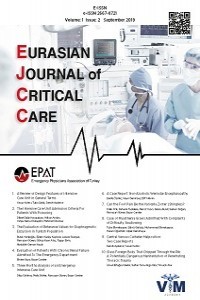Evaluation of Post-Discharge Attitudes and Behaviors of Patients Affected by The COVİD-19 Pandemic
Evaluation of Post-Discharge Attitudes and Behaviors of Patients Affected by The COVİD-19 Pandemic
___
- 1. Guarner, J.Three Emerging Coronaviruses in Two Decades The Story of SARS, MERS, and Now COVID-19 Amerıcan Society for Clinical Pathology. Am J Clin Pathol. 2020; 9;153(4):420- 421
- 2. Budak F, Korkmaz Ş. COVİD-19 Pandemi Sürecine Yönelik Ge- nel Bir Değerlendirme: Türkiye Örneği. Sosyal Araştırmalar ve Yönetim Dergisi. 2020;(1):62-79
- 3. T.C. Sağlık Bakanlığı Halk Sağlığı Genel Müdürlüğü. COVİD-19 (SARS- CoV-2 enfeksiyonu) Ağır Pnömoni, Ards, Sepsis ve Septik Şok Yöntemi Bilimsel Danışma Kurulu Çalışma Reh- beri, 01 Haziran 2020 https://covid19bilgi.saglik.-gov.tr/tr/ covid-19-rehberi.html
- 4. Çobanoğlu N. COVID-19 Pandemisi ile Değişen Yaşamlar ve Toplumsal. Eurasian JHS. 2020;3(COVID-19 Special Is- sue):90-94
- 5. Wang J, Wang Z. Strengths, Weaknesses, Opportunities and Threats (SWOT) Analysis of China’s Prevention and Control Strategy for the COVID-19 Epidemic. Int J Environ Res Public Health. 2020;26;17(7):2235.
- 6. Aşkın R, Bozkurt Y, Zeybek Z. COVİD-19 Pandemisi: Psikolojik Etkileri Ve Terapötik Müdahaleler. İstanbul Ticaret Üniversitesi Sosyal Bilimler Dergisi. 2020;19(37):304–318.
- 7. Li W, Fang Y, Liao J, Yu W, Yao L, Cui H, Huang C. Clinical and CT features of the COVID-19 infection: comparison among four different age groups. European Geriatric Medicine. 2020;11(5):843–850.
- 8. Zandifar A, Badrfam R, Yazdani S, Arzaghi SM, Rahimi F, Gha- semi S, Qorbani M. Prevalence and severity of depression, anxiety, stress and perceived stress in hospitalized patients with COVID-19. Journal of Diabetes and Metabolic Disorders. 2020;19(2):1431–1438.
- 9. Khaled, H, Akhter M. The Outbreak of Novel Coronavirus Disease (COVID-19) Pandemic: Consequences on Public Mental Health. Journal of Brain Sciences. 2020;3(1):1–15.
- 10. Erdoğdu, Y., Koçoğlu, F., &Sevim, C. (2020). COVID-19 Pande- misi Sürecinde Anksiyete ile Umutsuzluk Düzeylerinin Psiko- sosyal ve Demografik Değişkenlere Göre İncelenmesi. Klinik psikiyatri syf;23
- 11. Tian F, Li H, Tian S, Yang J, Shao J, Tian C. Psychological Symptoms of Ordinary Chinese Citizens Based on SCL-90 During the Level I Emergency Response to COVID-19, Psychiatry Res. 2020;288:112992
- Başlangıç: 2019
- Yayıncı: Acil Tıp Uzmanları Derneği
Prognostic Value of the Systemic Immune-Inflammation Index in Acute Pulmonary Embolism
Charcot Arthropathy and Osteomyelitis: A Case of Diabetic Foot Syndrome
Hasiba KARİMİ, Ali Osman BALKAN, Derya AKBABA, Gizem YİLMAZ, Ömer Faruk ÇAKIROĞLU, Basar CANDER
Ahmet Burhan DOGAN, Bahadir TASLİDERE
Case Report with Non-Traumatic Hemoragic SVO and Spontaneous Pneumothorax
Ömer Faruk KÜÇÜK, Hakan HAKKOYMAZ, Muhammet Mustafa YILMAZ, Bedirhan ÖZDEMİR, Muhammed ALKAYA, Caner AKUFUK, Ali İhsan KİLCİ
Evaluation of Post-Discharge Attitudes and Behaviors of Patients Affected by The COVİD-19 Pandemic
Gokhan TANSEL, Bahadir TASLİDERE, Bilgehan DEMİR, Özcan ERDOĞAN
Broca’s Aphasia Caused by Hemorrhagic Stroke in a Young Patient: A Case Report
Furkan GEDİKLİOGLU, Melike KARACABAY, Yasemin PİSGİN, Bahadir TASLİDERE
Giant Cervical Tuberculous Lymphadenitis: Case Report
Oya GÜVEN, Lale TUNA, Süleyman Hilmi KONAR, Leyla PASAYEVA, Bedriye Feyza KURT
Mehmet TATLI, Gökhan EYÜPOĞLU, Özlem GÜNEYSEL, Hilal HOCAGİL, Hakan HAKKOYMAZ, Muhammed Semih GEDİK
General Approach to Cases of Drug Intoxication
Muhammed Semih GEDİK, Hakan HAKKOYMAZ, Ali İhsan KİLCİ, Ömer Faruk KÜÇÜK
